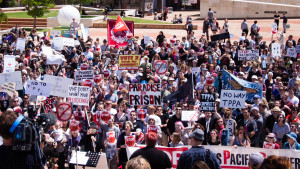I’ve been immersing myself in Jeremiah these past few weeks in an attempt to familiarise myself with it before my turn comes round in the preaching roster. When it comes to the Bible, the Old Testament prophets are not my strongest area of knowledge. It’s hard to know what they’re talking about at the best of times and it’s hard to know how and what to apply to us in the here and now.
Which is why I’m thankful for Bible commentaries and people who are far more learned than I am.
What has surprised me about Jeremiah is how relevant it is to us today. I know that on the surface it appears to be a book about Judah’s eventual downfall at the hands of the Babylonians – but looks can be deceiving!
The focus of my reading has been Jeremiah 20 because that’s what I’m preaching on. But there are some relevant things to note in the passages leading up to Chapter 20 that are important for us to be aware of due to how they relate to us now.
Jeremiah’s message of destruction and impending doom was meant for the people of Israel because they had turned away from God. But some of the illusions that Israel were holding on to are with us still today – Christopher Wright specifically makes mention of these three things:
- That the neglect of the poor, heartless oppression and growing social and economic equality do not really matter and life can go on as normal for the wealthy.
- That we make sacrifices in the area of family and children in order to achieve the “good things” (health, wealth, success) in life.
- That national security depends on stacking up your military power and juggling your pack of cards in international diplomacy and alliances – particularly relevant in the light of all the discussion happening about the TPPA.
Wright goes on to say: “Indeed the result of our folly could eventually make some parts of the planet uninhabitable or millions of the world’s poorest nations. At what point, one wonders, after God sends us so many warnings does the drama move from clay that can be moulded to produce a different future, to the hopelessness of a pot smashed beyond repair?” (See Jeremiah 18).
For me, it’s a question that demands a response. It reminds me that we are not only responsible for ourselves as individuals, but that we have a wider sense of call and responsibility to speak up for the things that are not right in our world. It’s not always the most popular thing to do, but remember that Jeremiah wasn’t popular (more on that on the 13th September).
I’d be keen to know what others think about this. What are the things you think we should be doing to “be the change”?


